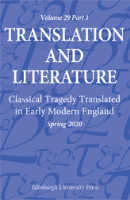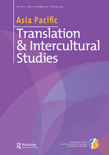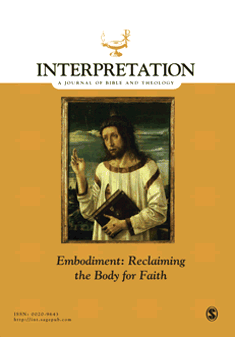
Bible Translator
Scope & Guideline
Cultivating Dialogue Between Theology and Linguistics
Introduction
Aims and Scopes
- Interdisciplinary Approaches to Translation:
The journal emphasizes collaboration between linguistics, theology, and cultural studies to provide comprehensive insights into translation practices. - Focus on Orality and Memory:
A significant area of study involves the translation of biblical texts for oral communities, exploring how oral traditions and memory influence translation methods. - Critical Examination of Translation Techniques:
Research often addresses the effectiveness of various translation strategies, such as dynamic equivalence and formal equivalence, assessing their impact on understanding biblical texts. - Cultural Contextualization:
The journal promotes the importance of contextualizing translations within specific cultural frameworks, ensuring that translations resonate with the target audience. - Engagement with Contemporary Issues:
It addresses modern challenges in Bible translation, including gender roles, interfaith dialogues, and the implications of globalization on translation practices.
Trending and Emerging
- Oral Bible Translation:
Increasing attention is given to oral Bible translation practices, particularly in communities with strong oral traditions, highlighting the need for effective engagement strategies. - Interfaith and Cross-Cultural Translation:
There is a rising focus on translation efforts that bridge Christian and Muslim texts, exploring how translations can foster dialogue and understanding between different faiths. - Gender and Translation Studies:
Emerging discussions around gender roles in biblical texts and their translation reflect a growing awareness of the need for inclusive language and representation. - Technological Innovations in Translation:
The incorporation of digital tools and methodologies in translation practices is becoming a prominent theme, showcasing how technology can enhance the translation process. - Contextual Hermeneutics:
An increasing emphasis on contextual and critical hermeneutics demonstrates a trend towards understanding translations within specific socio-cultural frameworks, enhancing their relevance and effectiveness.
Declining or Waning
- Traditional Linguistic Approaches:
There is a noticeable decline in papers strictly adhering to traditional linguistic frameworks, as the journal increasingly embraces more innovative and interdisciplinary methods. - Historical Translation Practices:
While historical perspectives remain important, there has been a reduction in articles solely focused on the historical aspects of Bible translation, as contemporary issues take precedence. - Translation of Lesser-Known Texts:
The focus on translating lesser-known or obscure biblical texts has diminished, with more emphasis placed on widely recognized scriptures and their contemporary applications.
Similar Journals

Trans-Revista de Traductologia
Pioneering Research in the Evolving Landscape of LanguageTrans-Revista de Traductologia, an esteemed journal in the realm of Translation Studies and Linguistics, is published by the University of Malaga's Faculty of Philosophy and Letters. With an Open Access model since 2015, it facilitates the global dissemination of research and findings, supporting the academic community and enhancing visibility for scholars. The journal spans research from 2012 to 2023 and has achieved a commendable Q2 ranking in the Linguistics and Language category for 2023, signifying its growing influence within the field. Its Scopus rankings reflect its competitive edge, positioned at #484 in Arts and Humanities as well as #565 in Social Sciences, as it continues to foster a platform for innovative and interdisciplinary investigation in language dynamics, translation practices, and cultural exchanges. Scholars, professionals, and students alike will find a rich resource within its pages to explore both theoretical frameworks and practical applications in translation.

Estudios de Traduccion
Fostering innovation in the art of translation.Estudios de Traduccion is a distinguished academic journal published by UNIV COMPLUTENSE MADRID, SERVICIO PUBLICACIONES, dedicated to advancing the field of translation studies. Since its establishment, the journal has embraced an Open Access model, providing researchers, professionals, and students with free and unrestricted access to high-quality scholarly articles since 2011. With the ISSN 2174-047X and E-ISSN 2254-1756, it serves as a vital resource for those interested in innovative methodologies, theoretical advancements, and practical applications within translation. By championing interdisciplinary research and fostering dialogue among scholars from diverse backgrounds, Estudios de Traduccion plays a crucial role in shaping the understanding of translation as a dynamic and evolving discipline. As a reputable platform, it invites contributions that stimulate critical thought and inspire future research in this essential area of communication.

Quaderns-Revista de Traduccio
Innovating Language Research for a Global AudienceQuaderns-Revista de Traduccio, published by the Universitat Autònoma de Barcelona, is a prominent journal in the field of Linguistics and Language, which has garnered recognition for its scholarly contributions since its inception. With an ISSN of 1138-5790 and an E-ISSN of 2014-9735, this journal has maintained an active publication schedule across notable cycles, contributing valuable insights from 2011 to 2018 and continuing from 2020 to 2024. As a Q3 category journal in both Arts and Humanities and Social Sciences related to Language and Linguistics, it occupies an important niche, ranking #607 out of 1088 and #692 out of 1167 respectively. Though currently not an open-access journal, its rigorous peer-review process ensures that published articles meet high academic standards, making them relevant for researchers, professionals, and students alike. Housed in Cerdanyola del Vallès, Barcelona, this journal serves as a critical platform for the dissemination of cutting-edge translation studies and linguistics research.

Translation and Literature
Illuminating the Art of Translation in LiteratureTranslation and Literature is a leading academic journal published by Edinburgh University Press, focusing on the intricate relationship between language and literature within the realms of translation studies. With an ISSN of 0968-1361 and an E-ISSN of 1750-0214, this journal provides a crucial platform for scholars and practitioners to explore and disseminate research that addresses both the theoretical and practical aspects of translation. Since its inception in 1996, Translation and Literature has established itself as an essential resource, particularly noted for its contributions to the fields of linguistics and literary theory, as indicated by its Q4 ranking in both categories in 2023. The journal's articles are designed to foster dialogue across disciplines, encouraging innovative thinking and collaboration among researchers, professionals, and students alike. Access to this valuable resource is currently available through subscription, ensuring high-quality scholarship reaches a diverse audience dedicated to advancing the understanding of translation's role in literature.

Journal of Specialised Translation
Advancing the Art of Translation StudiesThe Journal of Specialised Translation is a leading publication dedicated to the field of translation studies, contributing to the academic discourse since its inception in 2004. Published by Roehampton University School of Arts in the United Kingdom, this Open Access journal facilitates the dissemination of high-quality research findings, making it accessible to scholars worldwide. With an impressive ranking of Q1 in Linguistics and Language and positioning in the 88th percentile across both Arts and Humanities and Social Sciences categories on Scopus, the journal commands a significant reputation in the domain. It serves as a vital platform for innovative theories, methodologies, and case studies in specialised translation, appealing to researchers, professionals, and students alike. By fostering a collaborative environment, the journal not only highlights emerging trends but also encourages rigorous debate around translation practices, ensuring that its contributions are relevant to contemporary challenges in the field.

REVISTA DE FILOLOGIA DE LA UNIVERSIDAD DE LA LAGUNA
Navigating the rich tapestry of language and its applications.REVISTA DE FILOLOGIA DE LA UNIVERSIDAD DE LA LAGUNA is a prestigious academic journal dedicated to advancing the fields of linguistics and language studies. Published by the Universidad de la Laguna in Spain, this journal serves as an essential resource for researchers, professionals, and students alike, offering critical insights and scholarly articles that contribute to the understanding of language and its intricacies. With its inclusion in the Q3 category of the 2023 Linguistics and Language rankings and Scopus rankings, it demonstrates a growing impact within the academic community, while maintaining a commitment to fostering dialogue and disseminating valuable research. As a platform for innovative ideas and diverse perspectives, the journal aims to bridge theoretical approaches and practical applications, ensuring that readers are well-equipped to engage with contemporary issues in linguistics. Although it is currently not open access, the journal remains an influential contributor to the language and linguistics sectors, operating from the picturesque Canary Islands, enhancing its appeal not only as a scholarly resource but also as a culturally rich platform for academic expression.

Asia Pacific Translation and Intercultural Studies
Championing interdisciplinary scholarship in translation and intercultural studies.Asia Pacific Translation and Intercultural Studies is a vital academic journal published by Routledge Journals, Taylor & Francis Ltd, focusing on the interdisciplinary fields of translation studies and intercultural communication. With an ISSN of 2330-6343 and E-ISSN of 2330-6351, this journal plays a pivotal role in advancing scholarship in cultural studies and linguistics, earning a commendable Q2 ranking in both fields for 2023. The journal, catering to researchers, professionals, and students alike, aims to foster a deeper understanding of the myriad ways cultural contexts shape translation practices in the Asia-Pacific region and beyond. Despite its open access status being undisclosed, it regularly publishes high-quality peer-reviewed articles that contribute to the academic landscape, with a Scopus ranking reflecting its relevance and impact in interrelated domains. As the journal continues its mission from 2019 to 2024, it stands as an essential resource for anyone interested in the dynamics of translation and intercultural interactions in a rapidly globalizing world.

INTERPRETATION-A JOURNAL OF BIBLE AND THEOLOGY
Elevating discourse in Bible and theological studies.INTERPRETATION: A JOURNAL OF BIBLE AND THEOLOGY is a premier academic journal published by SAGE Publications Inc, dedicated to advancing the scholarship in the fields of Bible and theological studies. With an ISSN of 0020-9643 and an E-ISSN of 2159-340X, this journal has established itself as a vital resource for researchers, professionals, and students alike, particularly noted for its high ranking in the 2023 category quartiles as Q1 in Religious Studies. The journal consistently ranks #101 out of 644 in Scopus, highlighting its significant impact and wide-reaching influence within the academic community. Since its inception, spanning converged years from 1965 to 1966, 1998, and currently from 2002 to 2024, it has presented a wealth of innovative research, critical reviews, and theological discourse. Although it operates under a subscription model, the depth and rigor of published articles make it an indispensable platform for those engaging seriously with theological inquiry. The journal is headquartered in Thousand Oaks, California, and continues to serve as a cornerstone for deepening understanding and scholarship in religious studies.

LEA-Lingue e Letterature d Oriente e d Occidente
Innovating Research at the Crossroads of CulturesLEA-Lingue e Letterature d Oriente e d Occidente is an esteemed academic journal published by FIRENZE UNIV PRESS that specializes in the multifaceted exploration of linguistics and literature across Eastern and Western traditions. With its ISSN 1824-4920 and E-ISSN 1824-484X, this Open Access journal has been committed to democratizing knowledge since 2012, allowing researchers, scholars, and students unfettered access to a wealth of scholarly articles and critical studies. Recognized in the Q4 tier for both Linguistics and Language and Literature and Literary Theory in the 2023 category quartiles, LEA strives to bridge cultural and linguistic boundaries while fostering a deeper understanding of literary theory. Operating from its base in Florence, Italy, the journal serves as a vibrant platform for innovative research and discourse, particularly for those dedicated to comparative studies and interdisciplinary approaches in the humanities. Despite its current rankings on Scopus, LEA is poised for growth and aims to enhance its impact in the academic community by publishing cutting-edge research that interrogates linguistic and literary intersections.

Panacea-Boletin de Medicina y Traduccion
Advancing Interdisciplinary Insights in Linguistics and MedicinePanacea-Boletin de Medicina y Traduccion, published by TREMEDICA, serves as a valuable academic resource within the field of linguistics and language translation. With an ISSN of 1537-1964 and coverage from 2012 to 2023, this journal has established itself with an impressive Q2 ranking in the 2023 category of Linguistics and Language, indicating its significant contribution to the scholarly dialogue in this domain. The journal's rankings within Scopus, including the 41st percentile in Arts and Humanities and the 38th in Social Sciences, highlight its recognition and relevance among peers. Although it operates under a traditional access model, the journal remains committed to disseminating high-quality research that bridges the gap between medicine and linguistic translation, thereby enhancing interdisciplinary understanding and collaboration. For researchers, professionals, and students alike, Panacea-Boletin de Medicina y Traduccion stands as an essential publication for exploring emerging trends and fostering innovation in linguistic practices.